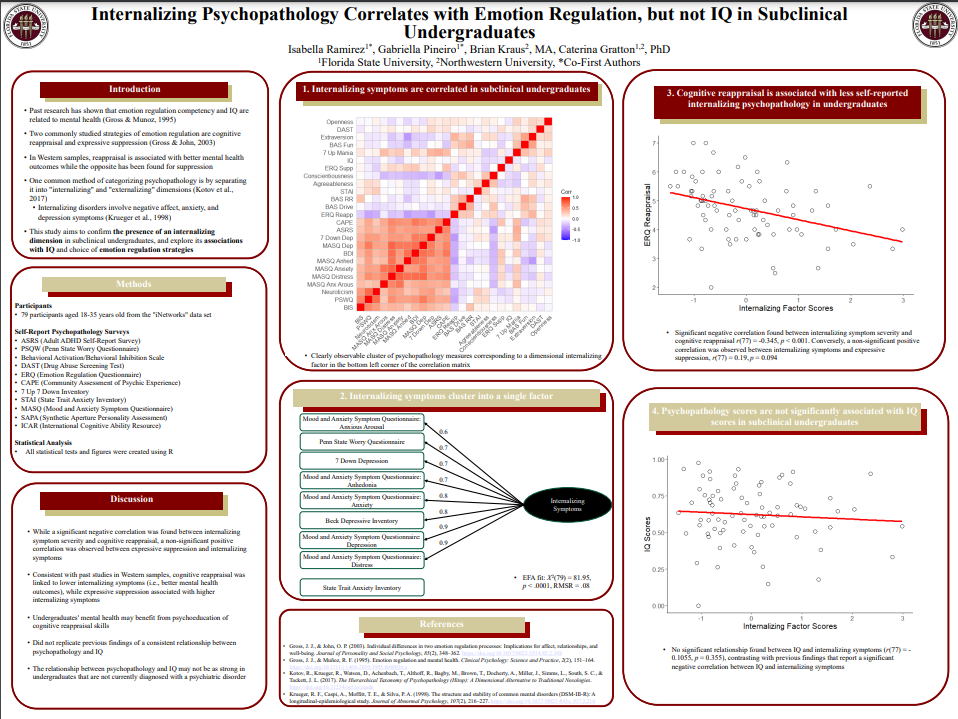Research Symposium
24th annual Undergraduate Research Symposium, April 3, 2024
Gabriella Pineiro Poster Session 3: 1:30 pm - 2:30 pm /15

BIO
I'm currently a senior at FSU pursuing a degree in Behavioral Neuroscience with a focus on a pre-medical track. Currently I work in the Gratton lab under Dr. Caterina Gratton where we use fMRI as well as EEG tests to establish areas of specific functionality within the brain. The brain fascinates me and as such, I am a huge advocate for mental health, especially amongst the youth population. I strive to help this population by obtaining a medical degree to work with children with psychiatric and/or developmental disorders. Our differences are what make us human! Heavily involved in campus activities including holding a President position in Alpha Epsilon Delta, a pre-health honor society. Currently serving as Health and Safety Officer in Alpha Chi Sigma and providing free tutoring for FSU students in various levels of chemistry.
Internalizing Psychopathology Correlates with Emotion Regulation, but not IQ in Subclinical Undergraduates
Authors: Gabriella Pineiro, Dr. Caterina GrattomStudent Major: Behavioral Neuroscience
Mentor: Dr. Caterina Grattom
Mentor's Department: Neuroscience Mentor's College: Arts and Science Co-Presenters: Isabella Ramirez
Abstract
The comorbidity of multiple psychiatric disorders can have a substantial effect on an individual’s treatment outcome. One commonly studied dimension of psychopathology are internalizing disorders, which generally encompass the experience of negative affect and include symptoms of anxiety and depressive disorders. Here, we sought to replicate the presence of an internalizing dimension in a sample of young adults and examine its relationships with IQ and emotion regulation strategies. Past research suggests that emotion regulation strategies have different outcomes on mental health, with cognitive reappraisal generally associated with better health outcomes versus expressive suppression. The current study included 79 participants 18-35 years old recruited from Northwestern and Florida State University. We replicated previous work using the Mood and Anxiety Symptom Questionnaire, Beck Depression Inventory, the depression scale of the 7-up 7-down measure, and the Penn State Worry Questionnaire. A significant negative correlation was observed between internalizing symptom severity and cognitive reappraisal, r(77) = -0.35, p=0.0009, but a non-significant positive was present for expressive suppression, r(77) = 0.19, p=0.0938. Thus, individuals who preferred cognitive reappraisal had lower levels of internalizing symptoms, and vice-versa for expressive suppression. Additionally, there was no significant relationship between IQ and internalizing symptoms, r(77) = -0.11, p=0.3548. As hypothesized, a clear internalizing factor was present in our data and it was associated with one’s choice of emotion regulation strategy. However, the IQ measure did not show a hypothesized negative correlation with internalizing symptoms. Future research should further examine the relationship between IQ and internalizing symptoms in young adults.
Keywords: Psychopathology, IQ, Emotion Regulation


